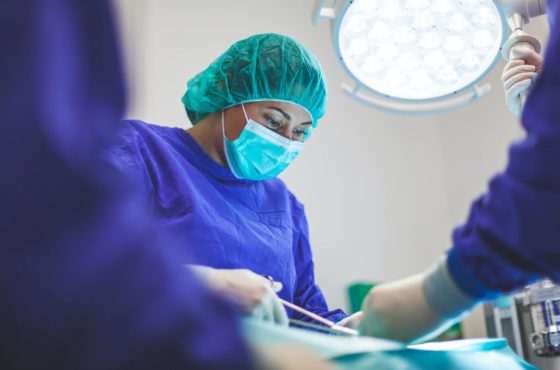Hernias are a common medical problem. It can affect men, women, and even children.
Hernias actually happen more frequently than you think.
In fact, the most common type of hernia, the inguinal hernia, affects 27% of men and 3% of women in the United States.
The surgical procedure used to fix hernias is called a hernia repair. It is also known as herniorrhaphy.
And often times, when surgical intervention is required, patients may wonder about the proper precautions after hernia surgery.
After all, a successful hernia surgery recovery means you get to safely return to the activities you enjoy without any complications.
Hernia Repair
Hernias occur when there is an abnormal exit of an organ or tissue pushes through the wall of the organ where it normally resides.
In most cases, occurrence of a hernia can be caused by a combination of weak muscles and anything that puts increased pressure on the abdomen, such as lifting heavy weights, diarrhea, constipation, obesity, or constant coughing or sneezing.
A hernia surgery returns the displaced organ to its proper position and fixes the weakened area of tissue.
However, this surgery may also come with significant risks and complications.
Some of which have been the concern of plaintiffs in the hernia mesh lawsuits.
Most of these complaints were filed following a hernia repair using a surgical mesh.
Some of the side effects linked to the use of a defective mesh in a surgery are organ perforation or obstruction, mesh adhesions, pain and discomfort, infection, and hernia recurrence, among others.
These adverse effects caused some manufacturers to take their hernia mesh implants off the market.
What to Expect After an Inguinal Hernia Repair
An inguinal hernia is the most common type of hernia. It occurs when a tissue protrudes through the inguinal canal, which is a passage through the muscles of the abdominal wall.
During an inguinal hernia surgery, the surgeon pushes the protruding organ back into place and strengthens the part of the abdominal wall which has a defect.
After an inguinal hernia repair, or any type of hernia surgery for that matter, most patients can expect to go home the same day, so be sure to have a family member or friend around to drive you home. Full recovery may take anywhere from four to six weeks after surgery.
After the procedure, it is also important to follow the precautions and guidelines set by your surgeon to have a successful hernia surgery recovery.
Dos and Don’ts for a Successful Hernia Surgery Recovery
Most people won’t be able to experience any negative long-term effects after having a hernia repair surgery.
In fact, the surgery is bound to improve any hernia-related pain and discomfort you were having before.
However, it is still important to follow your surgeon on how to spend your recovery time. You might want to take note of these things:
Physical Activity
Patients may feel confused or tired for up to three days following a hernia repair surgery. This may be a side effect of the anesthesia or pain medicine.
It is important not to engage in strenuous exercise or heavy lifting for at least around four to six weeks. Lifting at the early stage of recovery may cause hernias to come back. Strenuous exercise should wait until after 6 weeks of recovery.
Patients should also avoid lifting anything heavier than 15 pounds for around two weeks after your surgery, or as advised by your surgeon.
For about two weeks after the surgery, patients may also feel easily fatigued or worn out. These may put a limit to your activities as well.
Do not do anything that may cause you pain. Sexual intercourse may also be possible in about three weeks.
Diet
Recovery after hernia repair does not require any specific diet restrictions.
Some patients may notice having a poor appetite 1-2 weeks after surgery. This can be your normal response from the stress of the operation. Your appetite should come back in no time.
However, if you notice that you are always nauseated or you are unable to ingest liquids, call your doctor.
Returning to Work
Often times, patients are able to return to work within 1 to 2 weeks following surgery. However, in case of patients whose jobs require manual labor, recovery time may take longer before they can return to work.
For the best advice, patients should ask their doctor on when it is safe for them to fully return to work.
Driving
It is not advisable for patients to drive or drink alcohol for around two to three days after undergoing hernia repair.
Taking Care of Your Wound
You may shower 24-48 hours after surgery if the doctor approves of it. You may take off the gauze on the incisions before you shower.
However, there should be no pools, baths, or hot tubs for up to week 2.
It is also important to remember not to put any ointment or medication on your incisions, as it will not help with the healing process at all.
Bowel Movement
Bowel movements may occur 1-5 days after surgery, provided that you are not persistently nauseous or having abdominal pain.
During this period, it is also very common for a patient to pass a lot more gas than they used to.
A patient may also have diarrhea for the first few days after their surgery, but this normalizes in no time.
Constipation may also be normal due to the pain medication. Your doctor may advise for you to take another medication aside from the pain pills to further avoid constipation.
Does the Type of Hernia Surgery Affect Recovery Time?
Hernia repairs can either be done through open surgery, or the minimally invasive laparoscopic surgery.
So how does the two differ?
If your hernia was repaired through an open surgery, then your doctor most likely made a large incision near the location of your hernia in order to repair the weak area.
On the other hand, if your hernia was repaired with the laparoscopic surgery, your doctor made several small incision near the hernia to strengthen the weak area. This is why this operation is called minimally invasive, or only involves minimal damage of body tissue.
Because of this, laparoscopic surgery also means less downtime and recovery for most patients.
Either type of hernia repair surgery can be done with or without using surgical mesh.
When to Seek Medical Attention
The path to recovery is different for everyone.
It is important to tell your surgeon about any questions, concerns, or discomfort you are experiencing.
You should also call your surgeon if any of the following occurs:
- fever
- chills
- redness and swelling at the incision site
- bleeding incision
- pain that increases over time
- worsening nausea
- difficulty urinating
- inability to take in liquids



